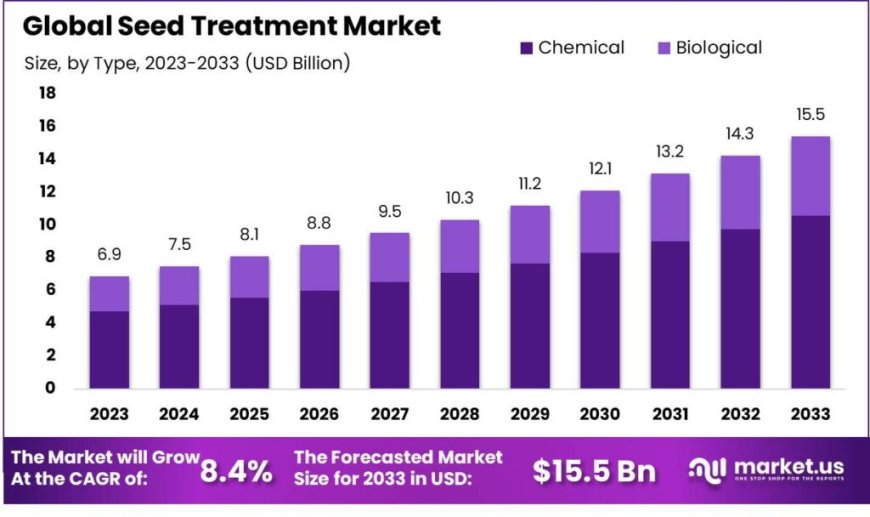Seed Treatment Solutions Gain Momentum with Advances in Biotech and Sustainability
Seed Treatment Market By Type (Chemical, Biological), By Crop Type [Oilseeds (Soybean, Cotton, Canola, Sunflower, Others), Cereals & Grains (Corn, Wheat, Rice, Sorghum, Barley, Others), Fruits & Vegetables ( Solanaceae, Cucurbits, Brassicas, Leafy vegetables, Root & bulb vegetables, Others), Other Crop Types], By Function [Seed Protection(Insecticides, Fungicides, Others), Seed Enhancement ( Bioinsectisides, Biofungicides, Others)], By Application (Coating, Dressing, Pelleting), by Region and Companies - Industry Segment Outlook, Market Assessment, Competition Scenario, Trends, and Forecast 2023-2033
Seed Treatment Market is anticipated to be USD 15.5 billion by 2033. It is estimated to record a steady CAGR of 8.4% in the Forecast period 2023 to 2033. It is likely to total USD 6.9 billion in 2023.
Seed treatment is a crucial practice in modern agriculture where different chemicals or biological substances are applied to seeds before planting. The main goal is to protect seeds from diseases, pests, and environmental stresses, while also improving their germination rate, vigor, and overall performance. This process helps ensure that seeds can establish themselves well in the soil and maximize their potential yield.
Download a sample report in MINUTES@ https://market.us/report/seed-treatment-market/request-sample/
The seed treatment market encompasses a range of products, technologies, and services related to treating seeds. This includes seed coatings, disinfection treatments against insects, fungicide applications, and biological treatments. The market has seen growth driven by increasing demand for high-quality seeds that can resist diseases and pests, the need to safeguard crops effectively, and the desire among farmers to enhance their crop yields from the very start.
By treating seeds before planting, farmers can mitigate risks during early growth stages, leading to healthier plants and potentially higher harvests. As a market research analyst, understanding these dynamics helps in analyzing market trends, forecasting demand for seed treatment products, and advising stakeholders on optimizing agricultural practices for sustainable and productive crop production.
Key Market Segments
By Type
-
Chemical
-
Biological
By Crop Type
-
Oilseeds
-
Soybean
-
Cotton
-
Canola
-
Sunflower
-
Others
-
Cereals & Grains
-
Corn
-
Wheat
-
Rice
-
Sorghum
-
Barley
-
Others
-
Fruits & Vegetables
-
Solanaceae
-
Cucurbits
-
Brassicas
-
Leafy vegetables
-
Root & bulb vegetables
-
Others
-
Other Crop Types
By Function
-
Seed Protection
-
Insecticides
-
Fungicides
-
Others
-
Seed Enhancement
-
Bioinsectisides
-
Biofungicides
-
Others
By Application
-
Coating
-
Dressing
-
Pelleting
By Type Analysis:
In 2023, the seed treatment market was dominated by the Chemical Segment, capturing over 68.6% market share, driven by its effectiveness in protecting crops from pests and diseases.
By Crop Type Analysis:
Cereals & Grains led the market with over 41.3% share, emphasizing their critical role in global food production and the need for enhanced crop efficiency.
By Function Analysis:
Seed Protection held a dominant position with more than 38.7% share, highlighting its role in safeguarding seeds from pests and diseases using insecticides and fungicides.
By Application Analysis:
The Coating Segment led with over 39% share, favored for its convenience in delivering multiple benefits like disease protection and nutrient incorporation in a single application, reflecting ongoing advancements in seed coating technologies.
Top Key Players
-
Syngenta International AG
-
Bayer Crop Science AG
-
BASF SE
-
Corteva Agriscience
-
Croda International PLC
-
KWS
-
Evologic Technologies
-
Borregaard
-
Amulix
-
ADAMA Ltd.
-
Bioworks Inc.
-
Certis Europe
Drivers:
Efficient crop protection and yield improvement are primary drivers, with seed treatments like insecticides and fungicides offering early defense against pests and diseases, enhancing crop appearance and yield. Growing environmental concerns and the shift towards sustainable agriculture also drive market growth, as seed treatments reduce the need for later chemical treatments and promote eco-friendly farming practices.
Restraints:
Regulatory challenges pose significant barriers, requiring rigorous safety evaluations and compliance with stringent regulations, which can be time-consuming and costly. Resistance management remains a concern, as pests and diseases develop resistance to existing seed treatment chemicals, necessitating continuous innovation. Consumer perceptions regarding safety and environmental impact of seed treatments also influence market dynamics. Competition from biological solutions, such as biopesticides, presents challenges to traditional chemical treatments, demanding adaptation and innovation from market players.
Opportunities:
Emerging markets in Asia, Africa, and Latin America offer substantial growth opportunities, driven by increasing agricultural activities and adoption of modern farming practices. Biological seed treatments are gaining popularity due to their eco-friendly nature, presenting avenues for market expansion through research and development investments.
Challenges:
While efficient crop protection and sustainability drive demand, navigating regulatory complexities and ensuring compliance remains challenging. Managing resistance and addressing consumer concerns about safety and environmental impact require ongoing research and communication efforts. Adapting to competition from biological alternatives necessitates innovation and differentiation in product offerings.


What's Your Reaction?
 Like
0
Like
0
 Dislike
0
Dislike
0
 Love
0
Love
0
 Funny
0
Funny
0
 Angry
0
Angry
0
 Sad
0
Sad
0
 Wow
0
Wow
0























































